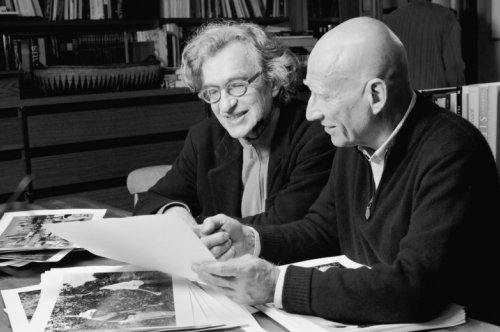Reviews - The Salt Of The Earth
The Salt Of The Earth
Reviewed By Vaughan Ames

The Salt Of The Earth
Our annual trip to Rheged was disturbed by the rain and the wind blocking the A66, stopping many people from getting to see 'The Salt of the Earth'. Having spent the afternoon trying to get updates on the state of the road, and being told it was going to be closed all night, it turned it was opened about 4.30...I found out just in time to get there late, but too late to tell anyone..!
I guess disasters like this put us in the mood for a film like 'The Salt of the Earth'. Sebastiao Salgado was educated as an economist, but threw this all up when he discovered photography. He was not interested in just taking pictures of pretty scenes, though; what inspired him was to try to change the world by showing what horrific things we humans can do to each other.
He spent 20 years going to famine-ravaged areas, war zones and observing terrible working conditions, producing photos for newspapers, but mainly wonderful books of his work and, alongside his wife, Lelia, organising talks and exhibitions to bring out these horrors. He found his way to Rwanda and the Congo, to (now ex) Yugoslavia and Ethiopia and his pictures – all in black and white – are a huge indictment on the world's lack of interest in the suffering there.
The pictures are, also, very...beautiful. A strange word to use of this subject matter, but I cannot find a better one. He manages to bring out something in the faces of the victims, in the background scenery, maybe just in the sheer angles of the bodies which is totally riveting.
It is this that has brought him some criticism over the years; was he selling horror to justify his art? I don't think so; you have to bear in mind his intent. Throughout everything, he wasn't just taking pictures, he was producing propaganda to try to change the world. He was totally involved in his projects, going away from home for years at a time, to the extent that his son Juliano hardly knew him.
It was Juliano, now 30ish, that made this film happen: in wanting to get to know his father, he followed him around with a movie camera showing the background to his life. To try to get an outsiders viewpoint as well, director Wim Wenders was also brought on board. The result is a film which is equally enthralling and beautiful. By combining coloured shots of Sebastiao taking pictures and the horror (and beauty) of the black and white stills, the two are brought together to show us Sebastiao's life.
This was made easier to do by the most recent 15 years of his life; his doctors told him that the horrors were killing him, so he went back to the farm in Brazil where he was brought up. During the years of his absence, the farm like much of Brazil, had been denuded of trees, leaving a scorched desert where little grew and animals could not survive. Lelia had the amazing idea of trying to regrow the rain forest and they have been responsible for the planting of over 2 million trees! The area is now recovering and the two of them have set out to take this message to the world (take a look at the TED talk he gives for further information AND to see some of his photographs).
Salgado's work inspired him back into photography, this time to produce a massive project as an homage to the beauty of the world, which leaves this film on a much happier note: not only are we able to plummet the depths of depravity as a species, we can also do incredible work if we set our minds to it.
Overall, then - and to quote one of the audience who went right round through Carlisle to get to this movie - this is "a cinematic masterpiece". I would have to agree.
I guess disasters like this put us in the mood for a film like 'The Salt of the Earth'. Sebastiao Salgado was educated as an economist, but threw this all up when he discovered photography. He was not interested in just taking pictures of pretty scenes, though; what inspired him was to try to change the world by showing what horrific things we humans can do to each other.
He spent 20 years going to famine-ravaged areas, war zones and observing terrible working conditions, producing photos for newspapers, but mainly wonderful books of his work and, alongside his wife, Lelia, organising talks and exhibitions to bring out these horrors. He found his way to Rwanda and the Congo, to (now ex) Yugoslavia and Ethiopia and his pictures – all in black and white – are a huge indictment on the world's lack of interest in the suffering there.
The pictures are, also, very...beautiful. A strange word to use of this subject matter, but I cannot find a better one. He manages to bring out something in the faces of the victims, in the background scenery, maybe just in the sheer angles of the bodies which is totally riveting.
It is this that has brought him some criticism over the years; was he selling horror to justify his art? I don't think so; you have to bear in mind his intent. Throughout everything, he wasn't just taking pictures, he was producing propaganda to try to change the world. He was totally involved in his projects, going away from home for years at a time, to the extent that his son Juliano hardly knew him.
It was Juliano, now 30ish, that made this film happen: in wanting to get to know his father, he followed him around with a movie camera showing the background to his life. To try to get an outsiders viewpoint as well, director Wim Wenders was also brought on board. The result is a film which is equally enthralling and beautiful. By combining coloured shots of Sebastiao taking pictures and the horror (and beauty) of the black and white stills, the two are brought together to show us Sebastiao's life.
This was made easier to do by the most recent 15 years of his life; his doctors told him that the horrors were killing him, so he went back to the farm in Brazil where he was brought up. During the years of his absence, the farm like much of Brazil, had been denuded of trees, leaving a scorched desert where little grew and animals could not survive. Lelia had the amazing idea of trying to regrow the rain forest and they have been responsible for the planting of over 2 million trees! The area is now recovering and the two of them have set out to take this message to the world (take a look at the TED talk he gives for further information AND to see some of his photographs).
Salgado's work inspired him back into photography, this time to produce a massive project as an homage to the beauty of the world, which leaves this film on a much happier note: not only are we able to plummet the depths of depravity as a species, we can also do incredible work if we set our minds to it.
Overall, then - and to quote one of the audience who went right round through Carlisle to get to this movie - this is "a cinematic masterpiece". I would have to agree.
Find A Film
Search over 1500 films in the Keswick Film Club archive.
Friends
KFC is friends with Caldbeck Area Film Society and Brampton Film Club and members share benefits across all organisations
Awards
Keswick Film Club won the Best New Film Society at the British Federation Of Film Societies awards in 2000.
Since then, the club has won Film Society Of The Year and awards for Best Programme four times and Best Website twice.
We have also received numerous Distinctions and Commendations in categories including marketing, programming and website.
 Talking Pictures
The KFC Newsletter
Talking Pictures
The KFC Newsletter
Links Explore the internet with Keswick Film Club


